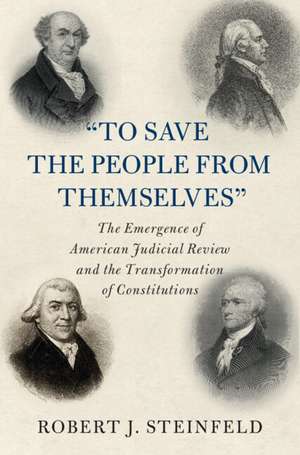'To Save the People from Themselves': The Emergence of American Judicial Review and the Transformation of Constitutions: Cambridge Historical Studies in American Law and Society
Autor Robert J. Steinfelden Limba Engleză Hardback – 29 sep 2021
Din seria Cambridge Historical Studies in American Law and Society
-
 Preț: 282.48 lei
Preț: 282.48 lei - 8%
 Preț: 392.23 lei
Preț: 392.23 lei -
 Preț: 350.46 lei
Preț: 350.46 lei -
 Preț: 179.45 lei
Preț: 179.45 lei -
 Preț: 266.97 lei
Preț: 266.97 lei -
 Preț: 180.21 lei
Preț: 180.21 lei -
 Preț: 278.34 lei
Preț: 278.34 lei -
 Preț: 294.57 lei
Preț: 294.57 lei - 11%
 Preț: 689.78 lei
Preț: 689.78 lei -
 Preț: 438.66 lei
Preț: 438.66 lei -
 Preț: 278.29 lei
Preț: 278.29 lei - 14%
 Preț: 759.00 lei
Preț: 759.00 lei -
 Preț: 239.66 lei
Preț: 239.66 lei -
 Preț: 188.27 lei
Preț: 188.27 lei -
 Preț: 409.22 lei
Preț: 409.22 lei -
 Preț: 287.07 lei
Preț: 287.07 lei -
 Preț: 274.88 lei
Preț: 274.88 lei - 14%
 Preț: 803.54 lei
Preț: 803.54 lei -
 Preț: 436.55 lei
Preț: 436.55 lei -
 Preț: 272.75 lei
Preț: 272.75 lei -
 Preț: 224.06 lei
Preț: 224.06 lei -
 Preț: 224.24 lei
Preț: 224.24 lei -
 Preț: 322.12 lei
Preț: 322.12 lei -
 Preț: 239.48 lei
Preț: 239.48 lei - 11%
 Preț: 652.59 lei
Preț: 652.59 lei -
 Preț: 269.09 lei
Preț: 269.09 lei -
 Preț: 312.62 lei
Preț: 312.62 lei - 14%
 Preț: 792.72 lei
Preț: 792.72 lei - 14%
 Preț: 687.06 lei
Preț: 687.06 lei -
 Preț: 270.63 lei
Preț: 270.63 lei -
 Preț: 268.51 lei
Preț: 268.51 lei -
 Preț: 439.80 lei
Preț: 439.80 lei - 11%
 Preț: 614.34 lei
Preț: 614.34 lei - 11%
 Preț: 654.29 lei
Preț: 654.29 lei
Preț: 375.69 lei
Nou
Puncte Express: 564
Preț estimativ în valută:
71.90€ • 78.07$ • 60.39£
71.90€ • 78.07$ • 60.39£
Carte disponibilă
Livrare economică 01-15 aprilie
Livrare express 18-22 martie pentru 47.14 lei
Preluare comenzi: 021 569.72.76
Specificații
ISBN-13: 9781108839235
ISBN-10: 1108839231
Pagini: 431
Dimensiuni: 158 x 235 x 32 mm
Greutate: 0.83 kg
Editura: Cambridge University Press
Colecția Cambridge University Press
Seria Cambridge Historical Studies in American Law and Society
Locul publicării:New York, United States
ISBN-10: 1108839231
Pagini: 431
Dimensiuni: 158 x 235 x 32 mm
Greutate: 0.83 kg
Editura: Cambridge University Press
Colecția Cambridge University Press
Seria Cambridge Historical Studies in American Law and Society
Locul publicării:New York, United States
Cuprins
Introduction. Part I. Legislatures and Legislation under the First American Constitutions: 1. The largely 'legislative' character of the ('Horizontal' and 'Vertical') constitutional checks placed on colonial legislatures; 2. The traditional nature of the first written constitutions and the role of legislatures as their primary expounders; 3. Restoring 'legislative' review of the laws: the New York Constitution of 1777; Part II. The Emergence Of American Judicial Review: 1779-1787: I. 1779-1782; 4. Supplementing traditional legislative 'revision' with judicial review: the New Jersey case of Holmes V. Walton, 1779-1780; 5. The debate over judicial review in the Virginia court of appeals: the case of the prisoners, 1782; II. 1784-1787: 6. The reappearance of 'vertical' judicial review in the case of Rutgers v. Waddington, New York, 1784; 7. The successful battle to establish judicial review in New Hampshire: the ten pound act cases, 1786-87, and their aftermath; 8. Judicial review and legislative supremacy in Rhode Island: the case of Trevett v. Weeden, 1786, and its aftermath; 9. The struggle between traditional constitutionalism and the constitution of judicial review in North Carolina: the case of Bayard v. Singleton, 1786-87, and its aftermath; Part III. Judicial Review at the Federal Convention: 10. Judicial review and the fate of traditional constitutionalism at the federal convention.
Recenzii
'In this meticulous study Robert Steinfeld examines how the distinctive US form of constitutional review emerged from a background tradition in which legislatures and executives assessed constitutionality in their regular work. Combining institutional, political, and intellectual history, Professor Steinfeld shows how the transformation was both rapid and strongly contested. Seeing judicial review as part of a conservative counterrevolution against the democratic excesses of post-Revolutionary legislatures, this is an important new contribution to long-standing discussions about judicial review in the United States.' Mark Tushnet, William Nelson Cromwell Professor of Law Emeritus, Harvard Law School
'This book is a major contribution to the historiography of American law from the 1750s through the first decade of the nineteenth century, representing an important advance in our understanding of the emergence of judicial review in America. The result of Steinfeld's painstaking investigations is to open up a lost world of what might be called 'pre-Constitutional' jurisprudence, and the gradual disintegration of that world as Americans came to understand constitutions, including the US federal Constitution, as a distinctive form of 'higher law' authority that was capable of being interpreted in the same fashion as other 'common law' sources. Anyone interested in exploring the origins of judicial review in America will need to reckon with Steinfeld's research and arguments.' G. Edward White, David and Mary Harrison Distinguished Professor of Law, University of Virginia School of Law
'This book is a major contribution to the historiography of American law from the 1750s through the first decade of the nineteenth century, representing an important advance in our understanding of the emergence of judicial review in America. The result of Steinfeld's painstaking investigations is to open up a lost world of what might be called 'pre-Constitutional' jurisprudence, and the gradual disintegration of that world as Americans came to understand constitutions, including the US federal Constitution, as a distinctive form of 'higher law' authority that was capable of being interpreted in the same fashion as other 'common law' sources. Anyone interested in exploring the origins of judicial review in America will need to reckon with Steinfeld's research and arguments.' G. Edward White, David and Mary Harrison Distinguished Professor of Law, University of Virginia School of Law
Notă biografică
Descriere
A far-reaching re-interpretation of the origins of American judicial review.
